高一Unit 1-Unit 2[下学期]
文档属性
| 名称 | 高一Unit 1-Unit 2[下学期] |
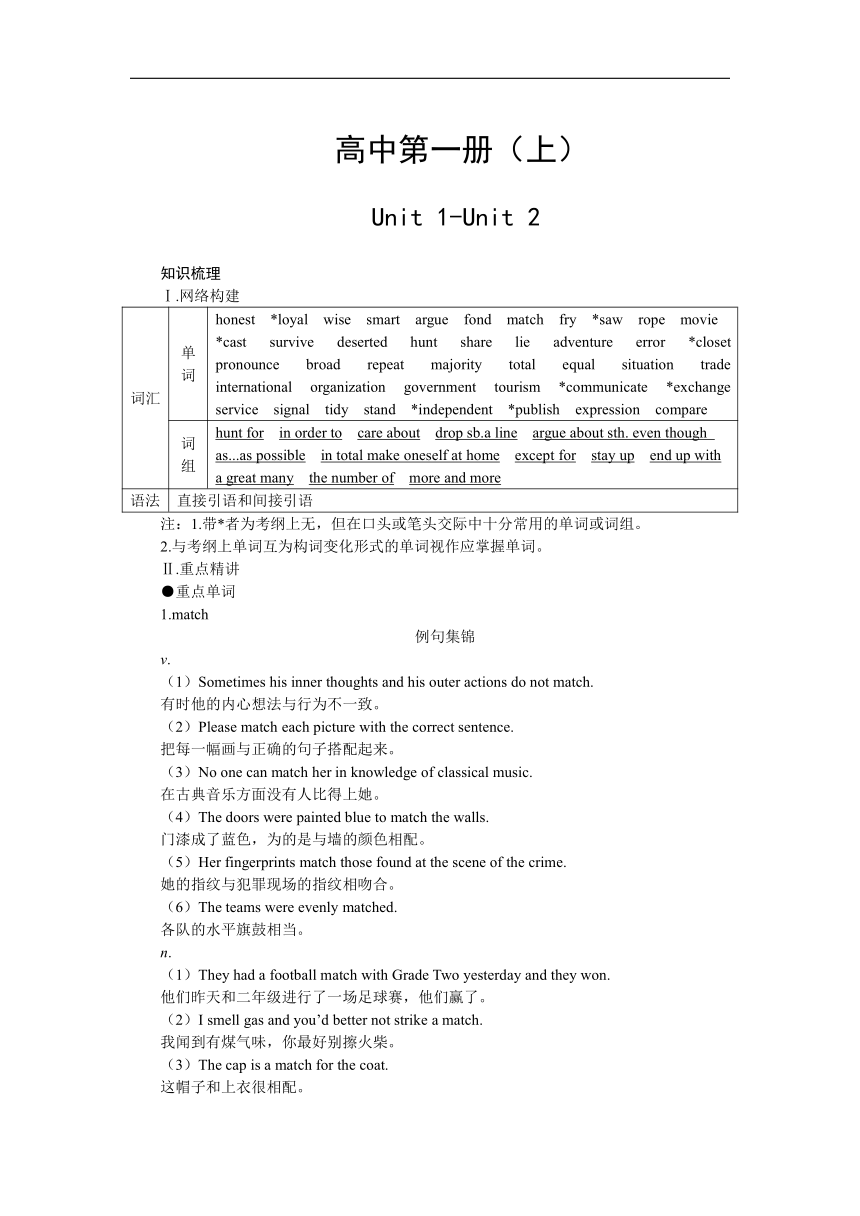
|
|
| 格式 | rar | ||
| 文件大小 | 21.9KB | ||
| 资源类型 | 教案 | ||
| 版本资源 | 通用版 | ||
| 科目 | 英语 | ||
| 更新时间 | 2007-05-01 09:52:00 | ||
图片预览

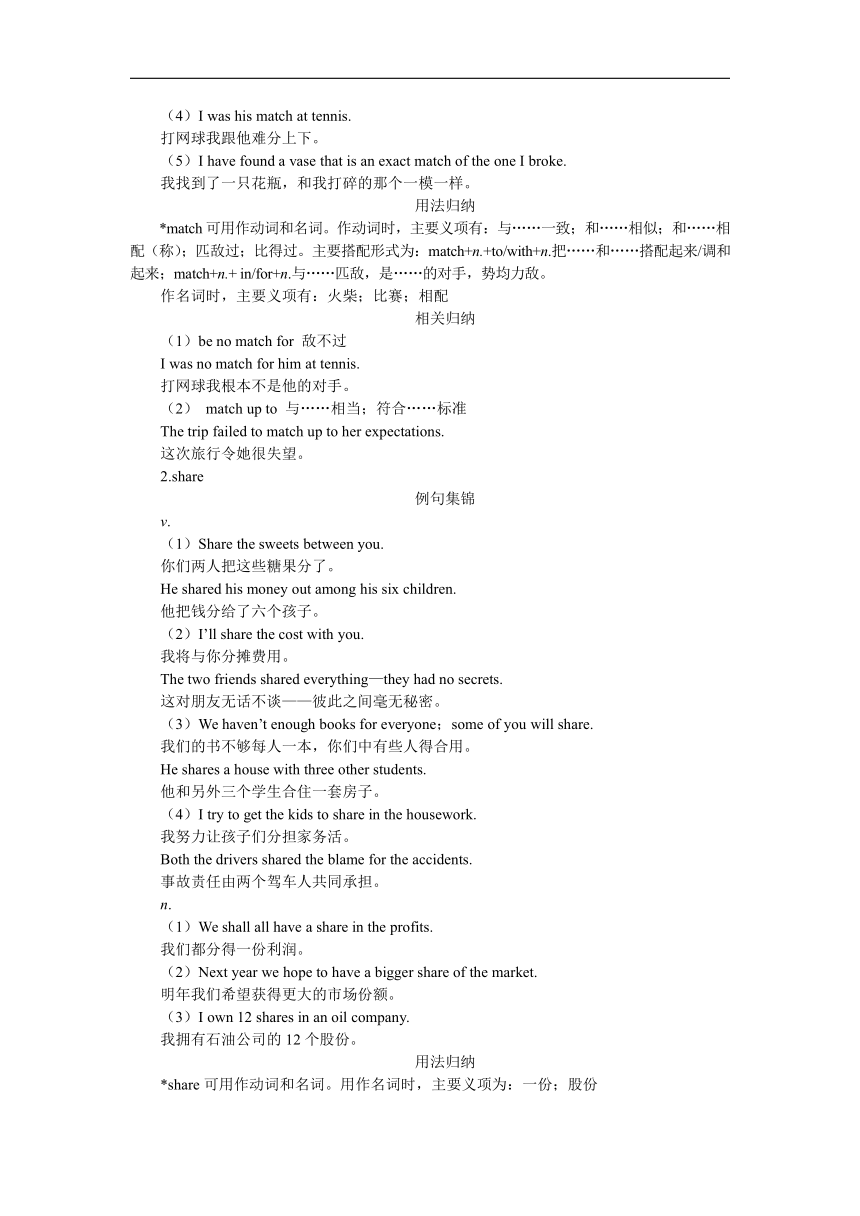
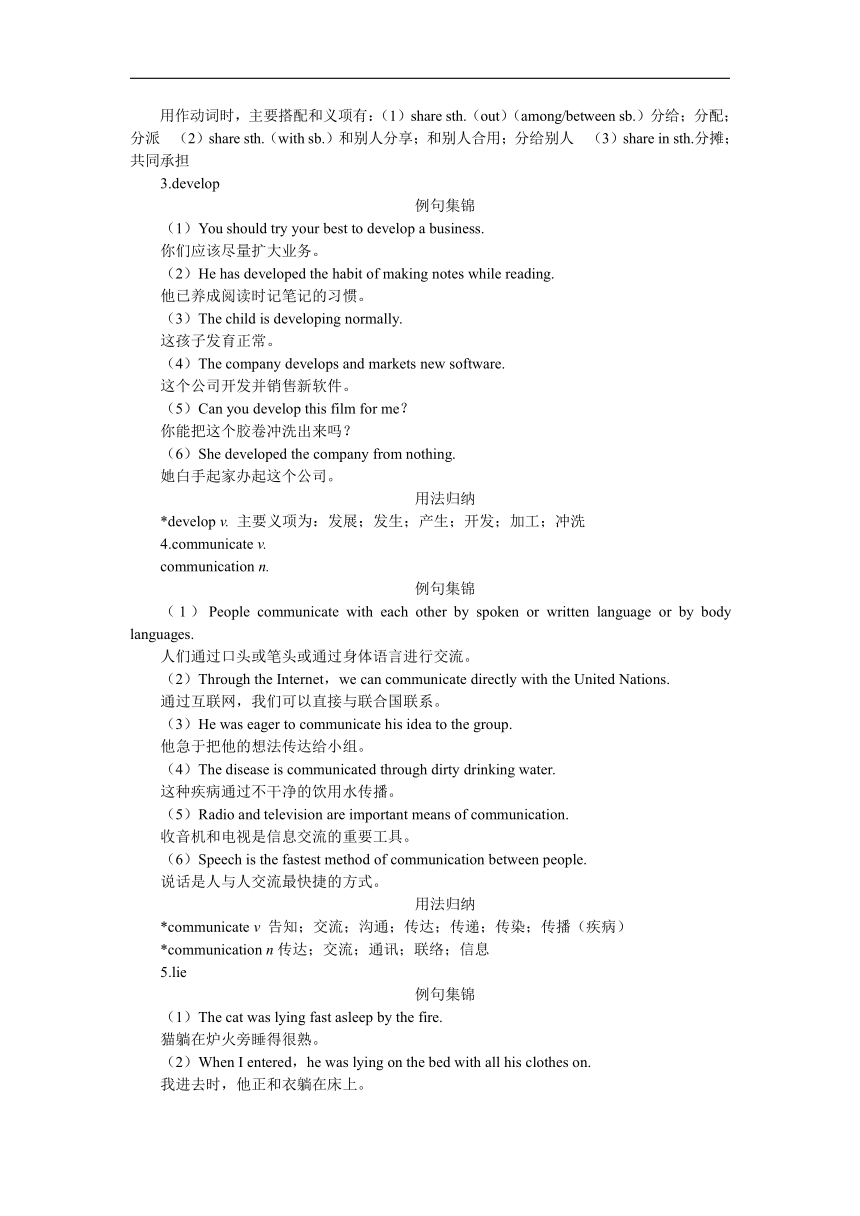
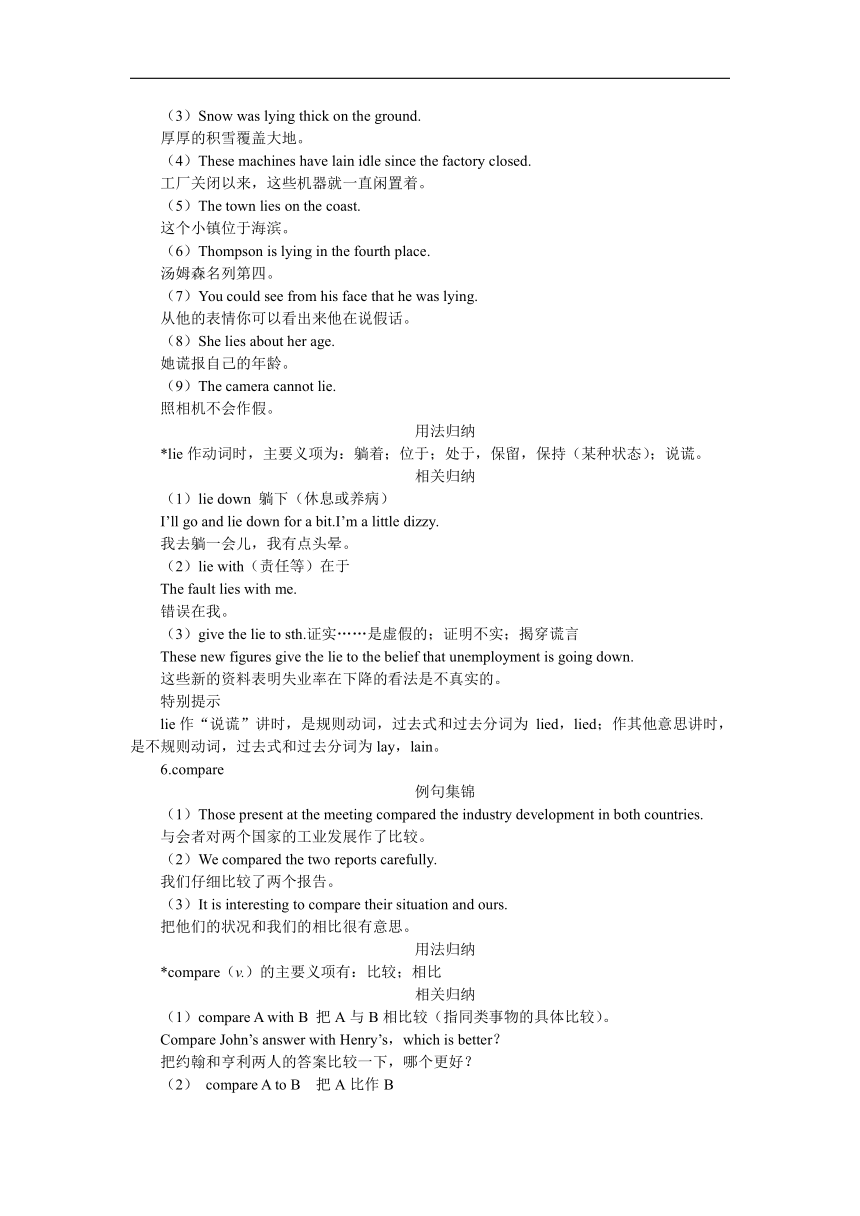
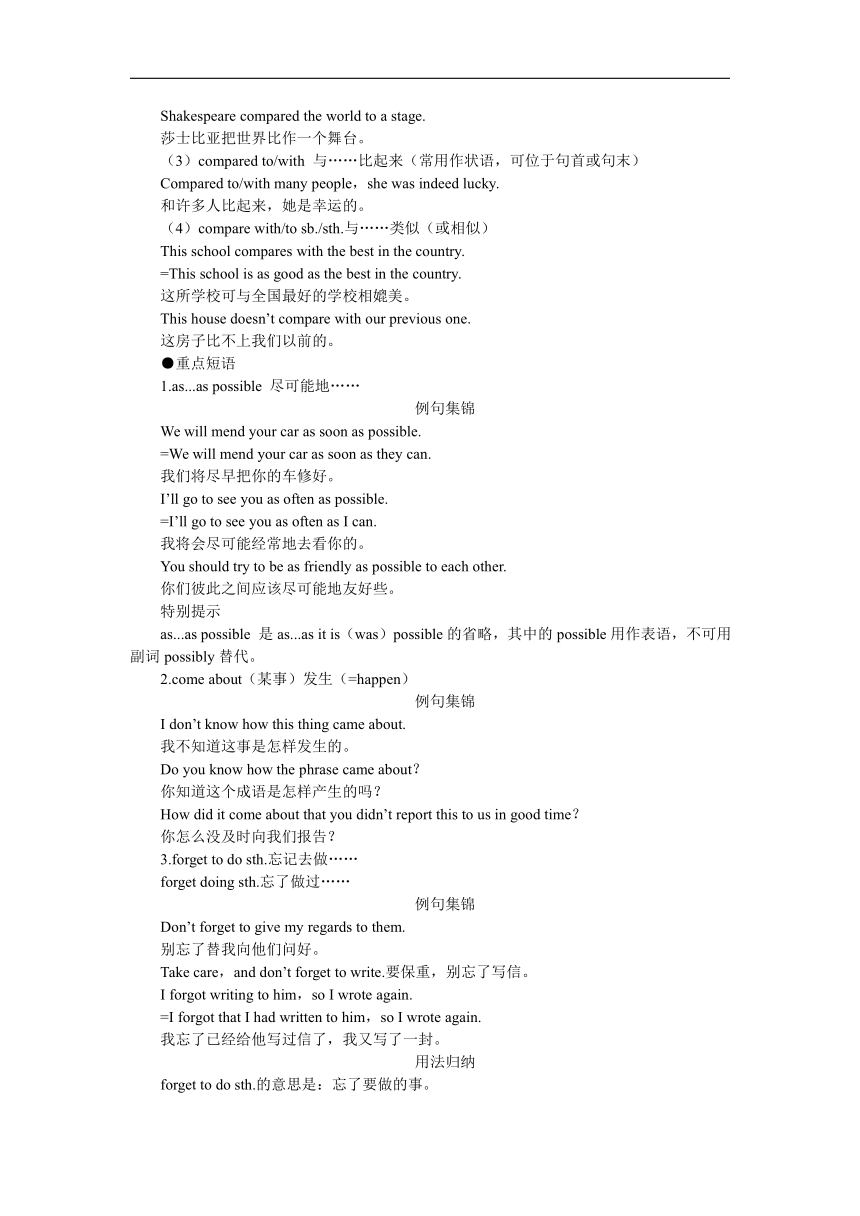
文档简介
高中第一册(上)
Unit 1-Unit 2
知识梳理
Ⅰ.网络构建
词汇 单词 honest *loyal wise smart argue fond match fry *saw rope movie*cast survive deserted hunt share lie adventure error *closet pronounce broad repeat majority total equal situation trade international organization government tourism *communicate *exchange service signal tidy stand *independent *publish expression compare
词组 hunt for in order to care about drop sb.a line argue about sth. even though as...as possible in total make oneself at home except for stay up end up with a great many the number of more and more
语法 直接引语和间接引语
注:1.带*者为考纲上无,但在口头或笔头交际中十分常用的单词或词组。
2.与考纲上单词互为构词变化形式的单词视作应掌握单词。
Ⅱ.重点精讲
●重点单词
1.match
例句集锦
v.
(1)Sometimes his inner thoughts and his outer actions do not match.
有时他的内心想法与行为不一致。
(2)Please match each picture with the correct sentence.
把每一幅画与正确的句子搭配起来。
(3)No one can match her in knowledge of classical music.
在古典音乐方面没有人比得上她。
(4)The doors were painted blue to match the walls.
门漆成了蓝色,为的是与墙的颜色相配。
(5)Her fingerprints match those found at the scene of the crime.
她的指纹与犯罪现场的指纹相吻合。
(6)The teams were evenly matched.
各队的水平旗鼓相当。
n.
(1)They had a football match with Grade Two yesterday and they won.
他们昨天和二年级进行了一场足球赛,他们赢了。
(2)I smell gas and you’d better not strike a match.
我闻到有煤气味,你最好别擦火柴。
(3)The cap is a match for the coat.
这帽子和上衣很相配。
(4)I was his match at tennis.
打网球我跟他难分上下。
(5)I have found a vase that is an exact match of the one I broke.
我找到了一只花瓶,和我打碎的那个一模一样。
用法归纳
*match可用作动词和名词。作动词时,主要义项有:与……一致;和……相似;和……相配(称);匹敌过;比得过。主要搭配形式为:match+n.+to/with+n.把……和……搭配起来/调和起来;match+n.+ in/for+n.与……匹敌,是……的对手,势均力敌。
作名词时,主要义项有:火柴;比赛;相配
相关归纳
(1)be no match for 敌不过
I was no match for him at tennis.
打网球我根本不是他的对手。
(2) match up to 与……相当;符合……标准
The trip failed to match up to her expectations.
这次旅行令她很失望。
2.share
例句集锦
v.
(1)Share the sweets between you.
你们两人把这些糖果分了。
He shared his money out among his six children.
他把钱分给了六个孩子。
(2)I’ll share the cost with you.
我将与你分摊费用。
The two friends shared everything—they had no secrets.
这对朋友无话不谈——彼此之间毫无秘密。
(3)We haven’t enough books for everyone;some of you will share.
我们的书不够每人一本,你们中有些人得合用。
He shares a house with three other students.
他和另外三个学生合住一套房子。
(4)I try to get the kids to share in the housework.
我努力让孩子们分担家务活。
Both the drivers shared the blame for the accidents.
事故责任由两个驾车人共同承担。
n.
(1)We shall all have a share in the profits.
我们都分得一份利润。
(2)Next year we hope to have a bigger share of the market.
明年我们希望获得更大的市场份额。
(3)I own 12 shares in an oil company.
我拥有石油公司的12个股份。
用法归纳
*share可用作动词和名词。用作名词时,主要义项为:一份;股份
用作动词时,主要搭配和义项有:(1)share sth.(out)(among/between sb.)分给;分配;分派 (2)share sth.(with sb.)和别人分享;和别人合用;分给别人 (3)share in sth.分摊;共同承担
3.develop
例句集锦
(1)You should try your best to develop a business.
你们应该尽量扩大业务。
(2)He has developed the habit of making notes while reading.
他已养成阅读时记笔记的习惯。
(3)The child is developing normally.
这孩子发育正常。
(4)The company develops and markets new software.
这个公司开发并销售新软件。
(5)Can you develop this film for me?
你能把这个胶卷冲洗出来吗?
(6)She developed the company from nothing.
她白手起家办起这个公司。
用法归纳
*develop v. 主要义项为:发展;发生;产生;开发;加工;冲洗
4.communicate v.
communication n.
例句集锦
(1)People communicate with each other by spoken or written language or by body languages.
人们通过口头或笔头或通过身体语言进行交流。
(2)Through the Internet,we can communicate directly with the United Nations.
通过互联网,我们可以直接与联合国联系。
(3)He was eager to communicate his idea to the group.
他急于把他的想法传达给小组。
(4)The disease is communicated through dirty drinking water.
这种疾病通过不干净的饮用水传播。
(5)Radio and television are important means of communication.
收音机和电视是信息交流的重要工具。
(6)Speech is the fastest method of communication between people.
说话是人与人交流最快捷的方式。
用法归纳
*communicate v 告知;交流;沟通;传达;传递;传染;传播(疾病)
*communication n传达;交流;通讯;联络;信息
5.lie
例句集锦
(1)The cat was lying fast asleep by the fire.
猫躺在炉火旁睡得很熟。
(2)When I entered,he was lying on the bed with all his clothes on.
我进去时,他正和衣躺在床上。
(3)Snow was lying thick on the ground.
厚厚的积雪覆盖大地。
(4)These machines have lain idle since the factory closed.
工厂关闭以来,这些机器就一直闲置着。
(5)The town lies on the coast.
这个小镇位于海滨。
(6)Thompson is lying in the fourth place.
汤姆森名列第四。
(7)You could see from his face that he was lying.
从他的表情你可以看出来他在说假话。
(8)She lies about her age.
她谎报自己的年龄。
(9)The camera cannot lie.
照相机不会作假。
用法归纳
*lie作动词时,主要义项为:躺着;位于;处于,保留,保持(某种状态);说谎。
相关归纳
(1)lie down 躺下(休息或养病)
I’ll go and lie down for a bit.I’m a little dizzy.
我去躺一会儿,我有点头晕。
(2)lie with(责任等)在于
The fault lies with me.
错误在我。
(3)give the lie to sth.证实……是虚假的;证明不实;揭穿谎言
These new figures give the lie to the belief that unemployment is going down.
这些新的资料表明失业率在下降的看法是不真实的。
特别提示
lie作“说谎”讲时,是规则动词,过去式和过去分词为 lied,lied;作其他意思讲时,是不规则动词,过去式和过去分词为lay,lain。
6.compare
例句集锦
(1)Those present at the meeting compared the industry development in both countries.
与会者对两个国家的工业发展作了比较。
(2)We compared the two reports carefully.
我们仔细比较了两个报告。
(3)It is interesting to compare their situation and ours.
把他们的状况和我们的相比很有意思。
用法归纳
*compare(v.)的主要义项有:比较;相比
相关归纳
(1)compare A with B 把A与B相比较(指同类事物的具体比较)。
Compare John’s answer with Henry’s,which is better?
把约翰和亨利两人的答案比较一下,哪个更好?
(2) compare A to B 把A比作B
Shakespeare compared the world to a stage.
莎士比亚把世界比作一个舞台。
(3)compared to/with 与……比起来(常用作状语,可位于句首或句末)
Compared to/with many people,she was indeed lucky.
和许多人比起来,她是幸运的。
(4)compare with/to sb./sth.与……类似(或相似)
This school compares with the best in the country.
=This school is as good as the best in the country.
这所学校可与全国最好的学校相媲美。
This house doesn’t compare with our previous one.
这房子比不上我们以前的。
●重点短语
1.as...as possible 尽可能地……
例句集锦
We will mend your car as soon as possible.
=We will mend your car as soon as they can.
我们将尽早把你的车修好。
I’ll go to see you as often as possible.
=I’ll go to see you as often as I can.
我将会尽可能经常地去看你的。
You should try to be as friendly as possible to each other.
你们彼此之间应该尽可能地友好些。
特别提示
as...as possible 是as...as it is(was)possible的省略,其中的possible用作表语,不可用副词possibly替代。
2.come about(某事)发生(=happen)
例句集锦
I don’t know how this thing came about.
我不知道这事是怎样发生的。
Do you know how the phrase came about?
你知道这个成语是怎样产生的吗?
How did it come about that you didn’t report this to us in good time?
你怎么没及时向我们报告?
3.forget to do sth.忘记去做……
forget doing sth.忘了做过……
例句集锦
Don’t forget to give my regards to them.
别忘了替我向他们问好。
Take care,and don’t forget to write.要保重,别忘了写信。
I forgot writing to him,so I wrote again.
=I forgot that I had written to him,so I wrote again.
我忘了已经给他写过信了,我又写了一封。
用法归纳
forget to do sth.的意思是:忘了要做的事。
forget doing sth.的意思是:忘了已做的事或已发生的事。
具有相似用法的动词(短语)还有:remember,regret等。
Remember to post the letters.
=Don’t forget to post the letters.
要记着去寄信。
I remember posting/having posted the letters.
=I posted the letters and I remember the actions.
我记得已把信寄了。
We regret to inform you that your account is overdrawn.
我们遗憾地通知你,你的账户已透支了。
I don’t regret telling her what I thought,even if it upset her.
我把想法告诉了她使她感到烦恼,但是我不后悔。
4.more or less大约;差不多,几乎
例句集锦
That table is more or less two meters long.
那张桌子大约两米长。
I’ve more or less finished the book.
我差不多已经读完这本书了。
She could earn $200 a day,more or less.
她一天大约能挣200美元。
用法归纳
more or less是一个固定结构,or不可换成and。more or less可以修饰数词,意为“大约”;还可修饰动词、分词、形容词,意为“或多或少,差不多,几乎”。通常放在系动词、助动词或情态动词之后,或放在动词之前,也可置于句末。
5.more than 超过;很;非常;不仅
例句集锦
That mountain is more than 1500 meters high.(=over)
这座山有1500多米高。
More than one person was invited.
接到邀请的不止一个人。
She is more than pleased with her daughter’s performance.(=very)
她对女儿的表演非常高兴。
Bamboo is used for more than building.
=Bamboo is not only used for building.
竹子不仅仅可以用来盖房子。
She was more than a little shaken by the experience.
这次经历对她产生了极大的震动。
Music is more than just sound —it is a way of thinking.
音乐不仅仅是一种声音 ——它是一种思考的方式。
用法归纳
“more than+数词+名词”等于“over+数词+名词”,意为“超过”。more than用于修饰形容词、名词或动词时,要看作习语,意思是“不仅、很、非常”。
相关归纳
(1)no more than 不超过
His whole school education added up to no more than one year.
他所受的学校教育加起来不超过一年。
(2)more A than B与其说B不如说A
She is more hardworking than wise.
与其说她聪明不如说她勤奋。
6.more and more 越来越……
例句集锦
More and more people are using the Internet.
越来越多的人在使用互联网。
He is getting fatter and fatter.
他越来越胖了。
She is becoming more and more interested in going into politics.
她对从政越来越感兴趣了。
We’re walking more and more slowly.
我们越走越慢了。
相关归纳
“the+比较级...,the+比较级...”相当于汉语的“越……,(就)越……”。该结构表示两个变化按比例同时递增/减。前一个“the+比较级...”结构为从属分句,后一个“the+比较级...”结构为主句。主句为一般将来时态时,从句(前一个“the+比较级...”结构)要用一般现在时。
The more you read,the more you’ll get.
你读得越多,就收获越大。
The sooner you start,the more quickly the work will be finished.
你开始得越早,工作就完成得越快。
The more difficult the problem is,the more interested he becomes.
题越难,他越感兴趣。
7.bring in 吸引,引入;请……做,让……参加;提出(新法案);赚得,挣
例句集锦
They started to use English,but they also brought in some words from their own languages.
他们开始使用英语,但是他们也从本族语言中引入了一些单词。
Experts were brought in to advise the government.
政府请来专家出谋划策。
They want to bring in a bill to limit arms exports.
他们想提出一项限制武器出口的议案。
We need to bring in a lot more new business.
我们得吸引更多的新业务。
How much does she bring in now?
她现在挣多少钱?
相关归纳
(1)bring about导致;引起
What brought about the change in his attitude?
是什么使他改变了主意?
(2)bring back把……送回;归还;使回忆起;恢复;重新使用
Please bring back all library books by the end of the week.
请在周末前把图书馆的书全部归还。
The photographs brought back many of pleasant memories.
照片给人带来很多美好的回忆。
Most people are against bringing back death penalty.
大多数人反对恢复死刑。
(3)bring down打垮;击败;降低;减少;(飞机)着陆;击落
The scandal may bring down the government.
那件丑闻可能使政府垮台。
We aim to bring down prices on all our computers.
我们打算降低我们所有计算机的价格。
The pilot managed to bring the plane down in the field.
飞行员设法将飞机降落在田里。
Twelve enemy fighters have been brought down.
有十二架敌方的战斗机被击落。
●必背句型
1.so或neither(nor)引导的(倒装)句型
教材原句
(1)Rock music is OK,and so is skiing.
摇滚乐很好,滑雪也不错。
(2)I don’t enjoy singing,nor do I like computers.
我不喜欢唱歌,也不喜欢计算机。
特别提示
1.“so+系动词(情态动词或助动词)+(与前句不同的)主语”表示前句中的肯定情况也适用于另一人或物。so代替上文中的动作或概念,表示“也是这样,也是如此”。注意:两句中应使用同类助动词且应时态一致。
2.“neither/nor+系动词(情态动词或助动词)+(与前句相同的)主语”表示连续的否定。
补充例句
(1)She can speak French and so can her husband.
=She can speak French and her husband can speak French,too.
她会讲法语,她的丈夫也会。
I have lost a bike and so has he.
= I have lost a bike and he has also lost one.
我丢了一辆自行车,他也丢了一辆。
(2)I don’t know where he has gone,nor do I care about.
我不知道他去哪里了,我也不关心。
相关归纳
(1)—I have never been to America.
我从未去过美国。
—Neither/Nor have I.(=I haven’t been to America,either.)
我也从未去过。
特别提示
“neither/nor+系动词(情态动词或助动词)+(与前句不同的)主语”表示前句中的否定情况也适用于另一人或物;由于neither/nor是否定词,所以不能再使用not。
(2004年江苏卷,21)I will never know what was on his mind at the time,nor will anyone else.
我将永远不会知道当时他心里是怎么想的,其他人也不会知道。
(2)—Tom likes playing basketball but he can’t play well.
汤姆喜欢打篮球,但他打得不好。
—So it is with me.(=I like playing basketball,too,but I can’t play well,either.)
我的情况与他相同。
特别提示
前句表述的某人或某物情况复杂,无法使用so或neither(nor)引导的倒装句型表达另一人或物情况相同,则用It is/was with sb./sth.。
—He is an honest worker and works hard.
他是一位诚实的工人,而且工作很卖力。
—So it is with you.
你也是这样的。
(3)—She can speak French.她会讲法语。
—So she can.(=You are right.She can speak French.)
她确实会讲法语。
特别提示
“So+(与前句相同的)主语+助动词”表示赞同,so译为“确实”,主谓不倒装。
2.so...that 如此……以至于……
教材原句
Chuck is a businessman who is always so busy that he has little time for his friends.
查克是个商人,他太忙了以至于很少有时间与朋友交往。
特别提示
so+adj./adv.+that...表示“如此……以至于”,that可省略;当so和它所修饰的形容词或副词放在句首时,主句倒装。
特别提示
补充例句
The weather was so fine that the children all went out,playing in the sun.
天气很好,孩子们都出去在阳光下玩耍。
So interesting is the book that I want to read it again.
=The book is so interesting that I want to read it again.
这本书太有趣了,我想再看一遍。
相关归纳
There are so many mistakes in your article that I can’t understand the meaning.
你的文章里错误百出,以致我无法看懂文意。
特别提示
在so...that句型中也可以使用名词,结构如下:
(1)so+few/many+可数名词复数+that
(2)so+little/much+不可数名词+that
(3)so+adj.+a(n)+名词+that=such+a(n)+adj.+名词+that
It was so cold a day that the ice in the river was nearly two feet thick.
=It was such a cold day that the ice in the river was nearly two feet thick.
天气太冷了,河里的冰有两英尺厚。
There was so much water in the river that we couldn’t swim across it.
河里的水太多了,我们游不过去。
3.should have done sth.过去应该干某事
教材原句
He also learns that he should have cared more about his friends.
他还明白了他以前应该多关心朋友。
特别提示
should have done表示“过去本应该做某事,而实际上没做”,含有责备的意味。
shouldn’t have done表示“过去不应该做某事,而实际上做了”,也含有责备的意味。
补充例句
(1)You should have come here yesterday.
你昨天应该到这里来。
(2)I’ll tell Mary about her new job tomorrow.
明天我将告诉玛丽她的新工作。
(2004年福建卷,32)You should have told her last week.
你上周就该告诉她。
(3)He shouldn’t have gone without telling us.
他不应该不告诉我们就走了。
(4)I shouldn’t have yelled at you that way.
我不该那样对你大喊大叫。
4.强调句型及其各种结构
教材原句
What is it that Joe can’t find in the bathroom?
乔在浴室里找不到的是什么?
特别提示
强调句型的结构如下:
(1)基本结构:It is/was +被强调部分+that/who +其余部分
(2)被强调句子是一般疑问句时,强调句结构:“Is/Was it+被强调部分+that/who +其他部分(用陈述语序)?”
(3)被强调部分是特殊疑问词时,强调句结构:“疑问词+is/was +that+其他部分(陈述语序)?”
(4)强调名词性从句引导词时,强调句结构:“引导词+it is/was+that+从句其他部分”。
(5)对not...until结构中until部分进行强调时,not需要放在被强调部分,句式为:“It is/was not until...that+主句部分(用肯定形式)”。
补充例句
(1)It was we that/who had a meeting in the meeting room yesterday afternoon.
昨天下午是我们在会议室开的会。
It was in the meeting room that we had a meeting yesterday afternoon.
昨天下午我们是在会议室开的会。
(2)Is it tomorrow that you will go to see him?
你是准备明天去看他吗?
Was it in the meeting room that you held the meeting yesterday afternoon?
你们昨天是在会议室开的会吗?
(3)Where was it that you held the meeting?
你们是在哪里开的会?
When is it that you will go to see him?
你准备在什么时间去看他?
(4)I don’t know what it was that he said at the meeting.
我不知道他在会上讲了什么。
He asked where it was that you held the meeting.
他问你们是在哪里开的会。
(5)It was not until you told me that I knew what he said at the meeting.
直到你告诉我,我才知道他在会上讲了什么。
It was not until midnight that he went back home after the experiment.
直到午夜他才做完实验回到家里。
疑难突破
1.match,suit,fit
match多指大小、色调、形状、性质等方面的搭配。
suit多指合乎需要、口味、性格、条件、地位等。
fit多指尺寸、形状合适,引申为吻合,协调。
应用
(1)His clothes don’t ______ his age.
(2)Does the time ______ you?
(3)The new coat ______ her well.It is neither too big nor too small.
(4)Which day ______ you,Saturday or Sunday?
答案:(1)match (2)suit (3)fits (4)suits
2.alone,lonely
(1)词性:alone可以作形容词和副词;lonely只能作形容词。
(2)用法:作形容词时,alone只能作表语,有时作宾补,不能作定语;lonely可以作表语和定语。alone不能用very修饰,而要说much alone,或very much alone。
(3)词义:作表语时,alone的意思是“独自一人”,指的是客观情况;lonely的意思是“寂寞”,指的是主观感觉。
(4)固定结构:leave/let sb./sth.alone 听任;别打扰;let alone更不用说。
应用
(1)He feels ______ though he has two brothers.
(2)The old man lives in a ______ house in the forest ______.
(3)When he woke up,he found himself ______ in the room.
(4)Though he is ______ at home,he doesn’t feel______,for he has many things to do.
(5)The baby can’t walk,let ______ run.
(6)Leave the machine ______.It’s dangerous.
答案:(1)lonely (2)lonely,alone (3)alone (4)alone,lonely (5)alone (6)alone
3.although,though
(1)一般情况下,两者可换用(although多用于句首)。
(2)所引导的让步状语从句放在主句前,从句中用部分倒装时,用though(=as)。
(3)只能说as though(=as if);even though(=even if)。
(4)though可用作副词,放在句末或句中,表示“然而、不过”,although不可。
应用
(1)______ they tried hard,they didn’t finish the work on time.
(2)They didn’t stop to have a rest ______ they were tired.
(3)He speaks English as ______ he were an Englishman.
(4)Even ______ he didn’t tell me anything about it,I know the whole thing.
(5)Child ______he is,he knows a lot about computers.
(6)He said he would help me with my English; he didn’t,______.
答案:(1)Although/Though (2)though/although (3)though (4)though (5)though (6)though
4.besides,except,except for,except that
besides意为“除……之外,尚有……或外加……”。
except将一个或几个人或物从同一类或普通的种类中除外,意为“除……之外”,指“不包括……”。其后可接名词、代词、副词、介词短语、动词不定式或wh-从句。
except for说明整个基本情况后,对细节加以纠正,后接名词。
except that的用法基本同except for,但其后必须接句子。它用来表示理由或细节,修正前面所说的情况。
应用
(1)We all succeeded ______Tom,so he is also glad.
(2)We all succeeded ______Tom,so he is very sad.
(3)He is a good man,______hot temper.
(4)Your article is quite good ______ there are several spelling mistakes.
(5)Your article is quite good ______several spelling mistakes.
答案:(1)besides (2)except (3)except for (4)except that (5)except for
5.a number of,the number of
a number of只能用作定语,修饰可数名词复数,意为“许多;若干”(=many)。number前可用large,small等修饰词。当它修饰主语时,谓语动词与它修饰的主语一致。
the number of 的意思是“……的数量;号码”。当它与后面的名词连用时,中心词是the number。如果用作主语,即使后面的名词是复数,谓语也要用单数。
应用
(1)______ trees planted in our village is never under 200 every year.
(2)We have lived here for ______ years.
(3)______ jobless people grows in the country at present.
(4)______ students are playing football on the playground.
(5)______ students in our class is over 70.
答案:(1)The number of (2)a number of (3)The number of (4)A number of (5)The number of
典例剖析
【例1】 (2005年春季北京,29)The Internet has brought______big changes in the way we work.
A.about B.out C.back D.up
剖析:本题考查动词短语。bring about导致,引起;bring out说明,阐明,出版;bring back把……送回,归还,使回忆起,恢复,重新使用;bring up抚养,培养,提起,提出。bring about符合句意,故选A。全句意思为:“因特网给我们工作的方式带来了很大的变化。”
答案:A
【例2】(2004年全国卷Ⅰ,26)—How about eight o’clock outside the cinema?
—That ______ me fine.
A.fits B.meets C.satisfies D.suits
剖析:本题考查动词的辨析。从语境看,对话的内容是在讨论见面的时间、地点,B、C两项意思不合适:meet的意思为“满足……的要求”时,后跟名词,不跟人称代词,例如:meet one’s wishes(满足某人的愿望);satisfy作“满足某人的需要,使满足”解时,带宾语,但是后不再跟修饰语;fit指“(大小、形状)合适”;suit意为“适合……的要求;对……方便”,后跟人称代词。从语境看,答话人对问话人所定的时间、地点感到适合、方便,故选D。
答案:D
【例3】 (2004年全国卷Ⅲ,27)Mr White ______ at 8:30 for the meeting,but he didn’t show up.
A.should have arrived B.should arrive
C.should have had arrived D.should be arriving
剖析:后句表明他没到达,因此选A项,因为should have done可以表示“过去本应该做某事,而实际上没做”,这与前句意思相符。B项和D项时态不对。C项结构搭配错误。
答案:A
【例4】 (2004年全国卷Ⅲ,32)—I would never come to this restaurant again.The food is terrible!
—______.
A.Nor am I B.Neither would I C.Same with me D.So do I
剖析:由于前句表达的是否定意思,首先排除D项;“Neither+助动词+主语”结构中的助动词应与前句的助动词保持一致,因此排除A项; C项结构错误。故选B。
答案:B
【例5】 (2004年全国卷Ⅲ,35)I do every single bit of housework ______ my husband Bob just does the dishes now and then.
A.since B.while C.when D.as
剖析:全句意为:“几乎所有的家务活都是我干的,而我的丈夫Bob只是偶尔洗洗盘子。”故选B。句中while表示对比,意为“而;然而”(=but)。此外,while还可表示:(1)虽然;尽管(=although)。(2)当……的时候。
答案:B
补充:
【例1】 (2004年春季上海,35)I’m going to the supermarket this afternoon.Do you have anything ______?
A.to be buying B.to buy C.for buying D.bought
剖析:have用作实义动词,作“有”讲时,其宾语后可用动词不定式作定语,本题就需要动词不定式作定语。全句意思是:“今天下午我去超市买东西,你有什么要买的吗?”
答案:B
【例2】 —David has made great progress recently.
—______ and ______.
A.So he has;so you have B.So he has;so have you
C.So has he;so have you D.So has he;so you have
剖析:本题的精巧之处在于将so的两种用法置于同一语境中。本题的意思是:“大卫最近取得了很大进步。”“他是取得了进步,你也取得了很大进步。”
答案:B
【例3】 (2002年高考上海,32)—You forgot your purse when you went out.
—Good heavens,______.
A.so did I B.so I did C.I did so D.I so did
剖析:本题考查副词so的意义和用法。正确解答本题的关键是要弄清两句话的主语是同一人。
“So+(与前句相同的)主语+助动词”表示赞同,so意为“确实”。而 “So+助动词+(与前句不同的)主语”表示上文说某人做了某事,下文说“另一个人”也做了某事。故不可选A项,应选B。
答案:B
Unit 1-Unit 2
知识梳理
Ⅰ.网络构建
词汇 单词 honest *loyal wise smart argue fond match fry *saw rope movie*cast survive deserted hunt share lie adventure error *closet pronounce broad repeat majority total equal situation trade international organization government tourism *communicate *exchange service signal tidy stand *independent *publish expression compare
词组 hunt for in order to care about drop sb.a line argue about sth. even though as...as possible in total make oneself at home except for stay up end up with a great many the number of more and more
语法 直接引语和间接引语
注:1.带*者为考纲上无,但在口头或笔头交际中十分常用的单词或词组。
2.与考纲上单词互为构词变化形式的单词视作应掌握单词。
Ⅱ.重点精讲
●重点单词
1.match
例句集锦
v.
(1)Sometimes his inner thoughts and his outer actions do not match.
有时他的内心想法与行为不一致。
(2)Please match each picture with the correct sentence.
把每一幅画与正确的句子搭配起来。
(3)No one can match her in knowledge of classical music.
在古典音乐方面没有人比得上她。
(4)The doors were painted blue to match the walls.
门漆成了蓝色,为的是与墙的颜色相配。
(5)Her fingerprints match those found at the scene of the crime.
她的指纹与犯罪现场的指纹相吻合。
(6)The teams were evenly matched.
各队的水平旗鼓相当。
n.
(1)They had a football match with Grade Two yesterday and they won.
他们昨天和二年级进行了一场足球赛,他们赢了。
(2)I smell gas and you’d better not strike a match.
我闻到有煤气味,你最好别擦火柴。
(3)The cap is a match for the coat.
这帽子和上衣很相配。
(4)I was his match at tennis.
打网球我跟他难分上下。
(5)I have found a vase that is an exact match of the one I broke.
我找到了一只花瓶,和我打碎的那个一模一样。
用法归纳
*match可用作动词和名词。作动词时,主要义项有:与……一致;和……相似;和……相配(称);匹敌过;比得过。主要搭配形式为:match+n.+to/with+n.把……和……搭配起来/调和起来;match+n.+ in/for+n.与……匹敌,是……的对手,势均力敌。
作名词时,主要义项有:火柴;比赛;相配
相关归纳
(1)be no match for 敌不过
I was no match for him at tennis.
打网球我根本不是他的对手。
(2) match up to 与……相当;符合……标准
The trip failed to match up to her expectations.
这次旅行令她很失望。
2.share
例句集锦
v.
(1)Share the sweets between you.
你们两人把这些糖果分了。
He shared his money out among his six children.
他把钱分给了六个孩子。
(2)I’ll share the cost with you.
我将与你分摊费用。
The two friends shared everything—they had no secrets.
这对朋友无话不谈——彼此之间毫无秘密。
(3)We haven’t enough books for everyone;some of you will share.
我们的书不够每人一本,你们中有些人得合用。
He shares a house with three other students.
他和另外三个学生合住一套房子。
(4)I try to get the kids to share in the housework.
我努力让孩子们分担家务活。
Both the drivers shared the blame for the accidents.
事故责任由两个驾车人共同承担。
n.
(1)We shall all have a share in the profits.
我们都分得一份利润。
(2)Next year we hope to have a bigger share of the market.
明年我们希望获得更大的市场份额。
(3)I own 12 shares in an oil company.
我拥有石油公司的12个股份。
用法归纳
*share可用作动词和名词。用作名词时,主要义项为:一份;股份
用作动词时,主要搭配和义项有:(1)share sth.(out)(among/between sb.)分给;分配;分派 (2)share sth.(with sb.)和别人分享;和别人合用;分给别人 (3)share in sth.分摊;共同承担
3.develop
例句集锦
(1)You should try your best to develop a business.
你们应该尽量扩大业务。
(2)He has developed the habit of making notes while reading.
他已养成阅读时记笔记的习惯。
(3)The child is developing normally.
这孩子发育正常。
(4)The company develops and markets new software.
这个公司开发并销售新软件。
(5)Can you develop this film for me?
你能把这个胶卷冲洗出来吗?
(6)She developed the company from nothing.
她白手起家办起这个公司。
用法归纳
*develop v. 主要义项为:发展;发生;产生;开发;加工;冲洗
4.communicate v.
communication n.
例句集锦
(1)People communicate with each other by spoken or written language or by body languages.
人们通过口头或笔头或通过身体语言进行交流。
(2)Through the Internet,we can communicate directly with the United Nations.
通过互联网,我们可以直接与联合国联系。
(3)He was eager to communicate his idea to the group.
他急于把他的想法传达给小组。
(4)The disease is communicated through dirty drinking water.
这种疾病通过不干净的饮用水传播。
(5)Radio and television are important means of communication.
收音机和电视是信息交流的重要工具。
(6)Speech is the fastest method of communication between people.
说话是人与人交流最快捷的方式。
用法归纳
*communicate v 告知;交流;沟通;传达;传递;传染;传播(疾病)
*communication n传达;交流;通讯;联络;信息
5.lie
例句集锦
(1)The cat was lying fast asleep by the fire.
猫躺在炉火旁睡得很熟。
(2)When I entered,he was lying on the bed with all his clothes on.
我进去时,他正和衣躺在床上。
(3)Snow was lying thick on the ground.
厚厚的积雪覆盖大地。
(4)These machines have lain idle since the factory closed.
工厂关闭以来,这些机器就一直闲置着。
(5)The town lies on the coast.
这个小镇位于海滨。
(6)Thompson is lying in the fourth place.
汤姆森名列第四。
(7)You could see from his face that he was lying.
从他的表情你可以看出来他在说假话。
(8)She lies about her age.
她谎报自己的年龄。
(9)The camera cannot lie.
照相机不会作假。
用法归纳
*lie作动词时,主要义项为:躺着;位于;处于,保留,保持(某种状态);说谎。
相关归纳
(1)lie down 躺下(休息或养病)
I’ll go and lie down for a bit.I’m a little dizzy.
我去躺一会儿,我有点头晕。
(2)lie with(责任等)在于
The fault lies with me.
错误在我。
(3)give the lie to sth.证实……是虚假的;证明不实;揭穿谎言
These new figures give the lie to the belief that unemployment is going down.
这些新的资料表明失业率在下降的看法是不真实的。
特别提示
lie作“说谎”讲时,是规则动词,过去式和过去分词为 lied,lied;作其他意思讲时,是不规则动词,过去式和过去分词为lay,lain。
6.compare
例句集锦
(1)Those present at the meeting compared the industry development in both countries.
与会者对两个国家的工业发展作了比较。
(2)We compared the two reports carefully.
我们仔细比较了两个报告。
(3)It is interesting to compare their situation and ours.
把他们的状况和我们的相比很有意思。
用法归纳
*compare(v.)的主要义项有:比较;相比
相关归纳
(1)compare A with B 把A与B相比较(指同类事物的具体比较)。
Compare John’s answer with Henry’s,which is better?
把约翰和亨利两人的答案比较一下,哪个更好?
(2) compare A to B 把A比作B
Shakespeare compared the world to a stage.
莎士比亚把世界比作一个舞台。
(3)compared to/with 与……比起来(常用作状语,可位于句首或句末)
Compared to/with many people,she was indeed lucky.
和许多人比起来,她是幸运的。
(4)compare with/to sb./sth.与……类似(或相似)
This school compares with the best in the country.
=This school is as good as the best in the country.
这所学校可与全国最好的学校相媲美。
This house doesn’t compare with our previous one.
这房子比不上我们以前的。
●重点短语
1.as...as possible 尽可能地……
例句集锦
We will mend your car as soon as possible.
=We will mend your car as soon as they can.
我们将尽早把你的车修好。
I’ll go to see you as often as possible.
=I’ll go to see you as often as I can.
我将会尽可能经常地去看你的。
You should try to be as friendly as possible to each other.
你们彼此之间应该尽可能地友好些。
特别提示
as...as possible 是as...as it is(was)possible的省略,其中的possible用作表语,不可用副词possibly替代。
2.come about(某事)发生(=happen)
例句集锦
I don’t know how this thing came about.
我不知道这事是怎样发生的。
Do you know how the phrase came about?
你知道这个成语是怎样产生的吗?
How did it come about that you didn’t report this to us in good time?
你怎么没及时向我们报告?
3.forget to do sth.忘记去做……
forget doing sth.忘了做过……
例句集锦
Don’t forget to give my regards to them.
别忘了替我向他们问好。
Take care,and don’t forget to write.要保重,别忘了写信。
I forgot writing to him,so I wrote again.
=I forgot that I had written to him,so I wrote again.
我忘了已经给他写过信了,我又写了一封。
用法归纳
forget to do sth.的意思是:忘了要做的事。
forget doing sth.的意思是:忘了已做的事或已发生的事。
具有相似用法的动词(短语)还有:remember,regret等。
Remember to post the letters.
=Don’t forget to post the letters.
要记着去寄信。
I remember posting/having posted the letters.
=I posted the letters and I remember the actions.
我记得已把信寄了。
We regret to inform you that your account is overdrawn.
我们遗憾地通知你,你的账户已透支了。
I don’t regret telling her what I thought,even if it upset her.
我把想法告诉了她使她感到烦恼,但是我不后悔。
4.more or less大约;差不多,几乎
例句集锦
That table is more or less two meters long.
那张桌子大约两米长。
I’ve more or less finished the book.
我差不多已经读完这本书了。
She could earn $200 a day,more or less.
她一天大约能挣200美元。
用法归纳
more or less是一个固定结构,or不可换成and。more or less可以修饰数词,意为“大约”;还可修饰动词、分词、形容词,意为“或多或少,差不多,几乎”。通常放在系动词、助动词或情态动词之后,或放在动词之前,也可置于句末。
5.more than 超过;很;非常;不仅
例句集锦
That mountain is more than 1500 meters high.(=over)
这座山有1500多米高。
More than one person was invited.
接到邀请的不止一个人。
She is more than pleased with her daughter’s performance.(=very)
她对女儿的表演非常高兴。
Bamboo is used for more than building.
=Bamboo is not only used for building.
竹子不仅仅可以用来盖房子。
She was more than a little shaken by the experience.
这次经历对她产生了极大的震动。
Music is more than just sound —it is a way of thinking.
音乐不仅仅是一种声音 ——它是一种思考的方式。
用法归纳
“more than+数词+名词”等于“over+数词+名词”,意为“超过”。more than用于修饰形容词、名词或动词时,要看作习语,意思是“不仅、很、非常”。
相关归纳
(1)no more than 不超过
His whole school education added up to no more than one year.
他所受的学校教育加起来不超过一年。
(2)more A than B与其说B不如说A
She is more hardworking than wise.
与其说她聪明不如说她勤奋。
6.more and more 越来越……
例句集锦
More and more people are using the Internet.
越来越多的人在使用互联网。
He is getting fatter and fatter.
他越来越胖了。
She is becoming more and more interested in going into politics.
她对从政越来越感兴趣了。
We’re walking more and more slowly.
我们越走越慢了。
相关归纳
“the+比较级...,the+比较级...”相当于汉语的“越……,(就)越……”。该结构表示两个变化按比例同时递增/减。前一个“the+比较级...”结构为从属分句,后一个“the+比较级...”结构为主句。主句为一般将来时态时,从句(前一个“the+比较级...”结构)要用一般现在时。
The more you read,the more you’ll get.
你读得越多,就收获越大。
The sooner you start,the more quickly the work will be finished.
你开始得越早,工作就完成得越快。
The more difficult the problem is,the more interested he becomes.
题越难,他越感兴趣。
7.bring in 吸引,引入;请……做,让……参加;提出(新法案);赚得,挣
例句集锦
They started to use English,but they also brought in some words from their own languages.
他们开始使用英语,但是他们也从本族语言中引入了一些单词。
Experts were brought in to advise the government.
政府请来专家出谋划策。
They want to bring in a bill to limit arms exports.
他们想提出一项限制武器出口的议案。
We need to bring in a lot more new business.
我们得吸引更多的新业务。
How much does she bring in now?
她现在挣多少钱?
相关归纳
(1)bring about导致;引起
What brought about the change in his attitude?
是什么使他改变了主意?
(2)bring back把……送回;归还;使回忆起;恢复;重新使用
Please bring back all library books by the end of the week.
请在周末前把图书馆的书全部归还。
The photographs brought back many of pleasant memories.
照片给人带来很多美好的回忆。
Most people are against bringing back death penalty.
大多数人反对恢复死刑。
(3)bring down打垮;击败;降低;减少;(飞机)着陆;击落
The scandal may bring down the government.
那件丑闻可能使政府垮台。
We aim to bring down prices on all our computers.
我们打算降低我们所有计算机的价格。
The pilot managed to bring the plane down in the field.
飞行员设法将飞机降落在田里。
Twelve enemy fighters have been brought down.
有十二架敌方的战斗机被击落。
●必背句型
1.so或neither(nor)引导的(倒装)句型
教材原句
(1)Rock music is OK,and so is skiing.
摇滚乐很好,滑雪也不错。
(2)I don’t enjoy singing,nor do I like computers.
我不喜欢唱歌,也不喜欢计算机。
特别提示
1.“so+系动词(情态动词或助动词)+(与前句不同的)主语”表示前句中的肯定情况也适用于另一人或物。so代替上文中的动作或概念,表示“也是这样,也是如此”。注意:两句中应使用同类助动词且应时态一致。
2.“neither/nor+系动词(情态动词或助动词)+(与前句相同的)主语”表示连续的否定。
补充例句
(1)She can speak French and so can her husband.
=She can speak French and her husband can speak French,too.
她会讲法语,她的丈夫也会。
I have lost a bike and so has he.
= I have lost a bike and he has also lost one.
我丢了一辆自行车,他也丢了一辆。
(2)I don’t know where he has gone,nor do I care about.
我不知道他去哪里了,我也不关心。
相关归纳
(1)—I have never been to America.
我从未去过美国。
—Neither/Nor have I.(=I haven’t been to America,either.)
我也从未去过。
特别提示
“neither/nor+系动词(情态动词或助动词)+(与前句不同的)主语”表示前句中的否定情况也适用于另一人或物;由于neither/nor是否定词,所以不能再使用not。
(2004年江苏卷,21)I will never know what was on his mind at the time,nor will anyone else.
我将永远不会知道当时他心里是怎么想的,其他人也不会知道。
(2)—Tom likes playing basketball but he can’t play well.
汤姆喜欢打篮球,但他打得不好。
—So it is with me.(=I like playing basketball,too,but I can’t play well,either.)
我的情况与他相同。
特别提示
前句表述的某人或某物情况复杂,无法使用so或neither(nor)引导的倒装句型表达另一人或物情况相同,则用It is/was with sb./sth.。
—He is an honest worker and works hard.
他是一位诚实的工人,而且工作很卖力。
—So it is with you.
你也是这样的。
(3)—She can speak French.她会讲法语。
—So she can.(=You are right.She can speak French.)
她确实会讲法语。
特别提示
“So+(与前句相同的)主语+助动词”表示赞同,so译为“确实”,主谓不倒装。
2.so...that 如此……以至于……
教材原句
Chuck is a businessman who is always so busy that he has little time for his friends.
查克是个商人,他太忙了以至于很少有时间与朋友交往。
特别提示
so+adj./adv.+that...表示“如此……以至于”,that可省略;当so和它所修饰的形容词或副词放在句首时,主句倒装。
特别提示
补充例句
The weather was so fine that the children all went out,playing in the sun.
天气很好,孩子们都出去在阳光下玩耍。
So interesting is the book that I want to read it again.
=The book is so interesting that I want to read it again.
这本书太有趣了,我想再看一遍。
相关归纳
There are so many mistakes in your article that I can’t understand the meaning.
你的文章里错误百出,以致我无法看懂文意。
特别提示
在so...that句型中也可以使用名词,结构如下:
(1)so+few/many+可数名词复数+that
(2)so+little/much+不可数名词+that
(3)so+adj.+a(n)+名词+that=such+a(n)+adj.+名词+that
It was so cold a day that the ice in the river was nearly two feet thick.
=It was such a cold day that the ice in the river was nearly two feet thick.
天气太冷了,河里的冰有两英尺厚。
There was so much water in the river that we couldn’t swim across it.
河里的水太多了,我们游不过去。
3.should have done sth.过去应该干某事
教材原句
He also learns that he should have cared more about his friends.
他还明白了他以前应该多关心朋友。
特别提示
should have done表示“过去本应该做某事,而实际上没做”,含有责备的意味。
shouldn’t have done表示“过去不应该做某事,而实际上做了”,也含有责备的意味。
补充例句
(1)You should have come here yesterday.
你昨天应该到这里来。
(2)I’ll tell Mary about her new job tomorrow.
明天我将告诉玛丽她的新工作。
(2004年福建卷,32)You should have told her last week.
你上周就该告诉她。
(3)He shouldn’t have gone without telling us.
他不应该不告诉我们就走了。
(4)I shouldn’t have yelled at you that way.
我不该那样对你大喊大叫。
4.强调句型及其各种结构
教材原句
What is it that Joe can’t find in the bathroom?
乔在浴室里找不到的是什么?
特别提示
强调句型的结构如下:
(1)基本结构:It is/was +被强调部分+that/who +其余部分
(2)被强调句子是一般疑问句时,强调句结构:“Is/Was it+被强调部分+that/who +其他部分(用陈述语序)?”
(3)被强调部分是特殊疑问词时,强调句结构:“疑问词+is/was +that+其他部分(陈述语序)?”
(4)强调名词性从句引导词时,强调句结构:“引导词+it is/was+that+从句其他部分”。
(5)对not...until结构中until部分进行强调时,not需要放在被强调部分,句式为:“It is/was not until...that+主句部分(用肯定形式)”。
补充例句
(1)It was we that/who had a meeting in the meeting room yesterday afternoon.
昨天下午是我们在会议室开的会。
It was in the meeting room that we had a meeting yesterday afternoon.
昨天下午我们是在会议室开的会。
(2)Is it tomorrow that you will go to see him?
你是准备明天去看他吗?
Was it in the meeting room that you held the meeting yesterday afternoon?
你们昨天是在会议室开的会吗?
(3)Where was it that you held the meeting?
你们是在哪里开的会?
When is it that you will go to see him?
你准备在什么时间去看他?
(4)I don’t know what it was that he said at the meeting.
我不知道他在会上讲了什么。
He asked where it was that you held the meeting.
他问你们是在哪里开的会。
(5)It was not until you told me that I knew what he said at the meeting.
直到你告诉我,我才知道他在会上讲了什么。
It was not until midnight that he went back home after the experiment.
直到午夜他才做完实验回到家里。
疑难突破
1.match,suit,fit
match多指大小、色调、形状、性质等方面的搭配。
suit多指合乎需要、口味、性格、条件、地位等。
fit多指尺寸、形状合适,引申为吻合,协调。
应用
(1)His clothes don’t ______ his age.
(2)Does the time ______ you?
(3)The new coat ______ her well.It is neither too big nor too small.
(4)Which day ______ you,Saturday or Sunday?
答案:(1)match (2)suit (3)fits (4)suits
2.alone,lonely
(1)词性:alone可以作形容词和副词;lonely只能作形容词。
(2)用法:作形容词时,alone只能作表语,有时作宾补,不能作定语;lonely可以作表语和定语。alone不能用very修饰,而要说much alone,或very much alone。
(3)词义:作表语时,alone的意思是“独自一人”,指的是客观情况;lonely的意思是“寂寞”,指的是主观感觉。
(4)固定结构:leave/let sb./sth.alone 听任;别打扰;let alone更不用说。
应用
(1)He feels ______ though he has two brothers.
(2)The old man lives in a ______ house in the forest ______.
(3)When he woke up,he found himself ______ in the room.
(4)Though he is ______ at home,he doesn’t feel______,for he has many things to do.
(5)The baby can’t walk,let ______ run.
(6)Leave the machine ______.It’s dangerous.
答案:(1)lonely (2)lonely,alone (3)alone (4)alone,lonely (5)alone (6)alone
3.although,though
(1)一般情况下,两者可换用(although多用于句首)。
(2)所引导的让步状语从句放在主句前,从句中用部分倒装时,用though(=as)。
(3)只能说as though(=as if);even though(=even if)。
(4)though可用作副词,放在句末或句中,表示“然而、不过”,although不可。
应用
(1)______ they tried hard,they didn’t finish the work on time.
(2)They didn’t stop to have a rest ______ they were tired.
(3)He speaks English as ______ he were an Englishman.
(4)Even ______ he didn’t tell me anything about it,I know the whole thing.
(5)Child ______he is,he knows a lot about computers.
(6)He said he would help me with my English; he didn’t,______.
答案:(1)Although/Though (2)though/although (3)though (4)though (5)though (6)though
4.besides,except,except for,except that
besides意为“除……之外,尚有……或外加……”。
except将一个或几个人或物从同一类或普通的种类中除外,意为“除……之外”,指“不包括……”。其后可接名词、代词、副词、介词短语、动词不定式或wh-从句。
except for说明整个基本情况后,对细节加以纠正,后接名词。
except that的用法基本同except for,但其后必须接句子。它用来表示理由或细节,修正前面所说的情况。
应用
(1)We all succeeded ______Tom,so he is also glad.
(2)We all succeeded ______Tom,so he is very sad.
(3)He is a good man,______hot temper.
(4)Your article is quite good ______ there are several spelling mistakes.
(5)Your article is quite good ______several spelling mistakes.
答案:(1)besides (2)except (3)except for (4)except that (5)except for
5.a number of,the number of
a number of只能用作定语,修饰可数名词复数,意为“许多;若干”(=many)。number前可用large,small等修饰词。当它修饰主语时,谓语动词与它修饰的主语一致。
the number of 的意思是“……的数量;号码”。当它与后面的名词连用时,中心词是the number。如果用作主语,即使后面的名词是复数,谓语也要用单数。
应用
(1)______ trees planted in our village is never under 200 every year.
(2)We have lived here for ______ years.
(3)______ jobless people grows in the country at present.
(4)______ students are playing football on the playground.
(5)______ students in our class is over 70.
答案:(1)The number of (2)a number of (3)The number of (4)A number of (5)The number of
典例剖析
【例1】 (2005年春季北京,29)The Internet has brought______big changes in the way we work.
A.about B.out C.back D.up
剖析:本题考查动词短语。bring about导致,引起;bring out说明,阐明,出版;bring back把……送回,归还,使回忆起,恢复,重新使用;bring up抚养,培养,提起,提出。bring about符合句意,故选A。全句意思为:“因特网给我们工作的方式带来了很大的变化。”
答案:A
【例2】(2004年全国卷Ⅰ,26)—How about eight o’clock outside the cinema?
—That ______ me fine.
A.fits B.meets C.satisfies D.suits
剖析:本题考查动词的辨析。从语境看,对话的内容是在讨论见面的时间、地点,B、C两项意思不合适:meet的意思为“满足……的要求”时,后跟名词,不跟人称代词,例如:meet one’s wishes(满足某人的愿望);satisfy作“满足某人的需要,使满足”解时,带宾语,但是后不再跟修饰语;fit指“(大小、形状)合适”;suit意为“适合……的要求;对……方便”,后跟人称代词。从语境看,答话人对问话人所定的时间、地点感到适合、方便,故选D。
答案:D
【例3】 (2004年全国卷Ⅲ,27)Mr White ______ at 8:30 for the meeting,but he didn’t show up.
A.should have arrived B.should arrive
C.should have had arrived D.should be arriving
剖析:后句表明他没到达,因此选A项,因为should have done可以表示“过去本应该做某事,而实际上没做”,这与前句意思相符。B项和D项时态不对。C项结构搭配错误。
答案:A
【例4】 (2004年全国卷Ⅲ,32)—I would never come to this restaurant again.The food is terrible!
—______.
A.Nor am I B.Neither would I C.Same with me D.So do I
剖析:由于前句表达的是否定意思,首先排除D项;“Neither+助动词+主语”结构中的助动词应与前句的助动词保持一致,因此排除A项; C项结构错误。故选B。
答案:B
【例5】 (2004年全国卷Ⅲ,35)I do every single bit of housework ______ my husband Bob just does the dishes now and then.
A.since B.while C.when D.as
剖析:全句意为:“几乎所有的家务活都是我干的,而我的丈夫Bob只是偶尔洗洗盘子。”故选B。句中while表示对比,意为“而;然而”(=but)。此外,while还可表示:(1)虽然;尽管(=although)。(2)当……的时候。
答案:B
补充:
【例1】 (2004年春季上海,35)I’m going to the supermarket this afternoon.Do you have anything ______?
A.to be buying B.to buy C.for buying D.bought
剖析:have用作实义动词,作“有”讲时,其宾语后可用动词不定式作定语,本题就需要动词不定式作定语。全句意思是:“今天下午我去超市买东西,你有什么要买的吗?”
答案:B
【例2】 —David has made great progress recently.
—______ and ______.
A.So he has;so you have B.So he has;so have you
C.So has he;so have you D.So has he;so you have
剖析:本题的精巧之处在于将so的两种用法置于同一语境中。本题的意思是:“大卫最近取得了很大进步。”“他是取得了进步,你也取得了很大进步。”
答案:B
【例3】 (2002年高考上海,32)—You forgot your purse when you went out.
—Good heavens,______.
A.so did I B.so I did C.I did so D.I so did
剖析:本题考查副词so的意义和用法。正确解答本题的关键是要弄清两句话的主语是同一人。
“So+(与前句相同的)主语+助动词”表示赞同,so意为“确实”。而 “So+助动词+(与前句不同的)主语”表示上文说某人做了某事,下文说“另一个人”也做了某事。故不可选A项,应选B。
答案:B
